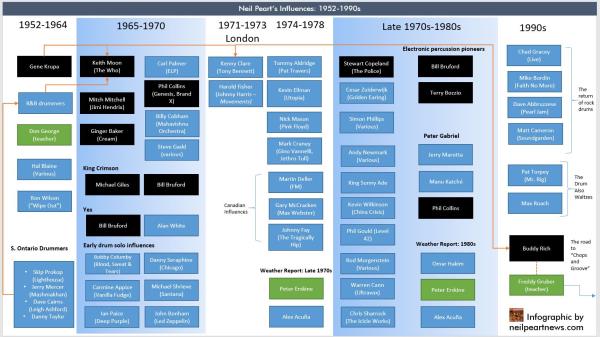Neil Peart's drumming influences |
|
Updated: 04/25/2020
In 1983 Neil Peart wrote about how he developed his drumming style, "One thing I have come to learn about influences is that although copying one style can never be original, copying many styles often is original... The best advice for someone who wants to develop an original style is: Don't copy one drummer, copy twenty! I copied a hundred." (Modern Drummer, February 1993)
In 2007, after nearly a quarter-century of playing with Rush, Peart reflected on his influences and inspirations in a slightly different way: "It will be understood, I hope, that the idea of being inspired by other drummers like that isn't to 'get ideas.' It's more about listening to great players and thinking to yourself, 'That's how good I want to be.' You get fired up to try to raise your game, and that's the spirit in which I showed up at the studio to start working on what would become Rush's nineteenth studio album, Snakes And Arrows." (Modern Drummer, August 2007)
Many of those "hundred" are represented here: from the 1950s through the 1990s (we'll add 2000 through 2015 at a later time). For a visual representation of Peart's influences, see this infographic.
- Early Influences: Big Band (1950s)
- Early Influences: R&B and Rock (1960s/early 1970s)
- Drum solo influences
- Rock influences: late 1960s/early 1970s
- 1970s influences
- 1980s influences
- 1990s influences
- Teachers (1965-2008)
- Bibliography
Scroll through the slides to read quotes from Peart about his drum influences.
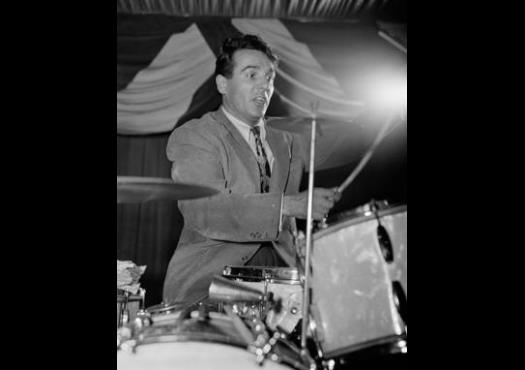 "Gene Krupa was the first rock drummer in very many ways. Without Gene Krupa, there wouldn't have been a Keith Moon."
"Gene Krupa was the first rock drummer in very many ways. Without Gene Krupa, there wouldn't have been a Keith Moon."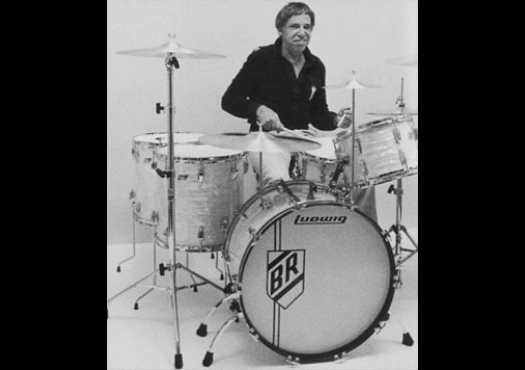 "...I would often see Buddy Rich play on television, on the 'Tonight' show, but I would just shake my head..."
"...I would often see Buddy Rich play on television, on the 'Tonight' show, but I would just shake my head..."- "Don George gave me a strong enough direction toward what I needed to know that I could follow it through those decades. Most of all, he gave me the encouragement that I could be a drummer..."
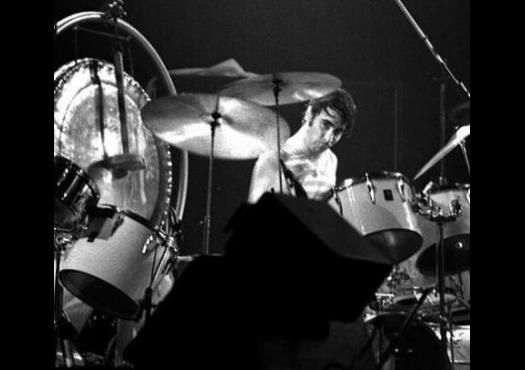 "It is certainly true that Keith Moon was one of the first drummers to get me really excited about rock drumming. His irreverent and maniacal personality, as expressed through his drumming, affected me greatly."
"It is certainly true that Keith Moon was one of the first drummers to get me really excited about rock drumming. His irreverent and maniacal personality, as expressed through his drumming, affected me greatly."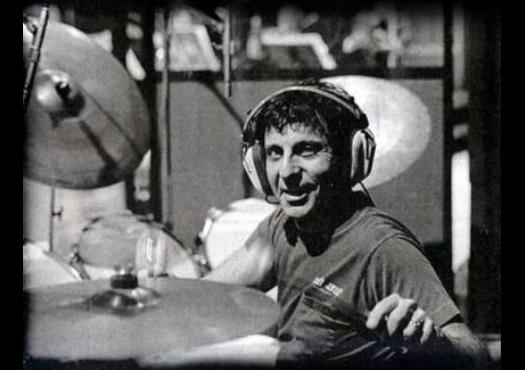 "When I was growing up, I played along to the radio, so I played along to Simon & Garfunkel, The Beach Boys, The Association, and The Byrds, and I was really playing along to Hal Blaine."
"When I was growing up, I played along to the radio, so I played along to Simon & Garfunkel, The Beach Boys, The Association, and The Byrds, and I was really playing along to Hal Blaine."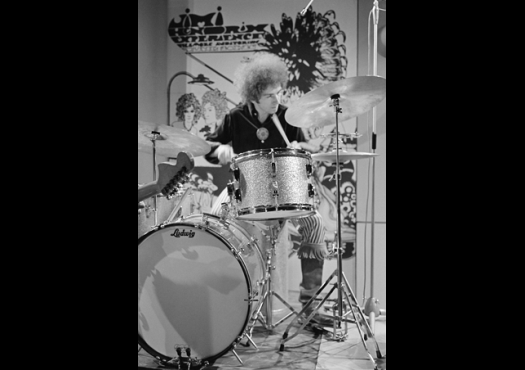 "...I remember my teacher (Don George) playing a record, then telling me, 'this changes everything.' It was Jimi Hendrix's Are You Experienced?, with Mitch Mitchell's artful and innovative drumming."
"...I remember my teacher (Don George) playing a record, then telling me, 'this changes everything.' It was Jimi Hendrix's Are You Experienced?, with Mitch Mitchell's artful and innovative drumming."- Terry Bozzio: "His thinking is so unique and he's a powerhouse, a true pioneer and with so much technique to back it up; he brings an acoustic drum style and language to exploring electronic drums."
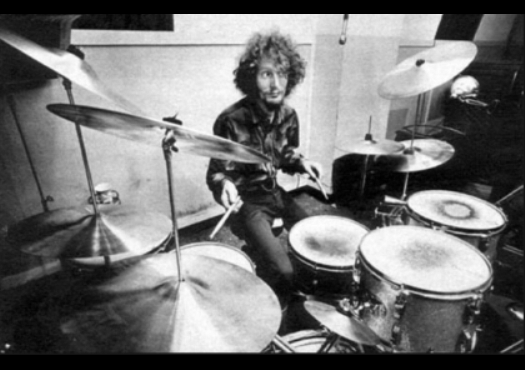 Ginger Baker: "His playing was revolutionary... He set the bar for what rock drumming could be. I certainly emulated Ginger's approaches to rhythm — his hard, flat, percussive sound was very innovative."
Ginger Baker: "His playing was revolutionary... He set the bar for what rock drumming could be. I certainly emulated Ginger's approaches to rhythm — his hard, flat, percussive sound was very innovative."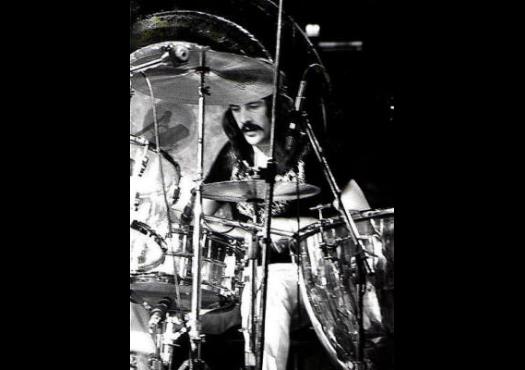 "When I was starting out, very young, John Bonham and Led Zeppelin were new in those olden days, and John Bonham did always the big triplets with his giant bass drum."
"When I was starting out, very young, John Bonham and Led Zeppelin were new in those olden days, and John Bonham did always the big triplets with his giant bass drum."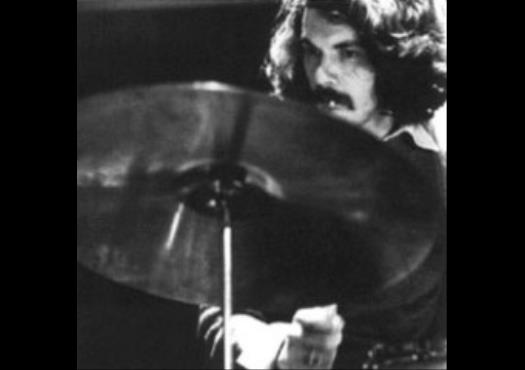 Michael Giles: "His fill construction and sense of ensemble playing and orchestrating a part was unparalleled and very underrated."
Michael Giles: "His fill construction and sense of ensemble playing and orchestrating a part was unparalleled and very underrated."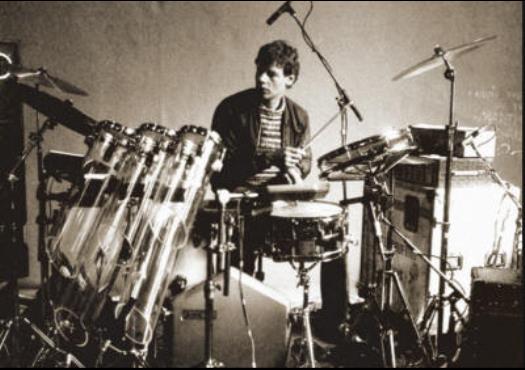 "Bill Bruford found early success with the English rock band Yes, early favorites of mine, and his playing on their first five albums was a strong influence on me in the early 1970s."
"Bill Bruford found early success with the English rock band Yes, early favorites of mine, and his playing on their first five albums was a strong influence on me in the early 1970s."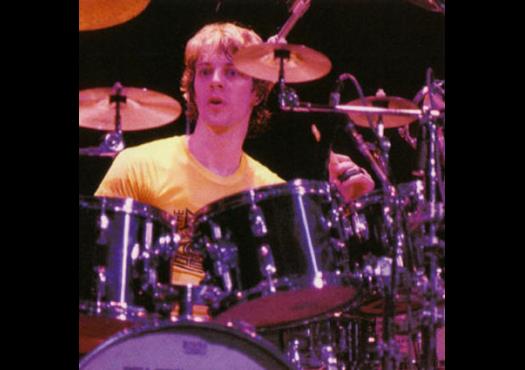 Stewart Copeland: "There's a band called The Police and their drummer plays with simplicity, but with such gusto. It's great. He just has a new approach."
Stewart Copeland: "There's a band called The Police and their drummer plays with simplicity, but with such gusto. It's great. He just has a new approach."- "I got into a more disciplined style later on as I gained a little more understanding on the technical side. People like Carl Palmer (and other drummers) were all influences."
- "Phil Collins was an enormous influence on my drumming in the '70s, and thus remains a part of my playing even today."
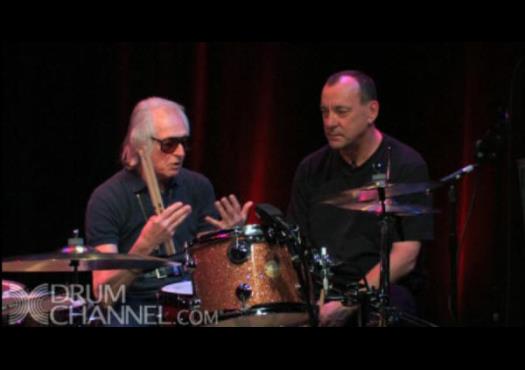 Freddie Gruber: "He guided me through a complete reinvention of my approach to the drums (no small undertaking after 30 years of playing)."
Freddie Gruber: "He guided me through a complete reinvention of my approach to the drums (no small undertaking after 30 years of playing)."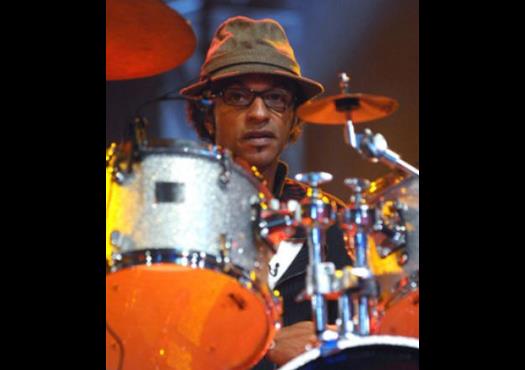 "There's also something I hear Manu Katché doing with Peter Gabriel and Robbie Robertson: insinuating the rhythm — playing all around the beat without actually playing it, but it's absolutely there."
"There's also something I hear Manu Katché doing with Peter Gabriel and Robbie Robertson: insinuating the rhythm — playing all around the beat without actually playing it, but it's absolutely there."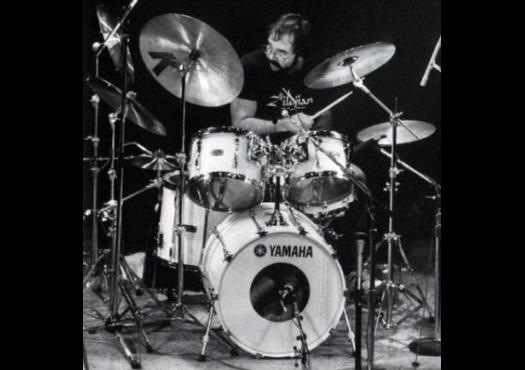 Peter Erskine, Third Teacher: "It was Peter who helped me conquer—or at least attack—what was for me the Final Frontier: improvisation."
Peter Erskine, Third Teacher: "It was Peter who helped me conquer—or at least attack—what was for me the Final Frontier: improvisation."
Infographic of Neil Peart's influences: 1952-1990s
This infographic maps all the influences in one place.
Key: Black highlight = Major influence; Green highlight = teacher.
For any questions, comments, or corrections, please send me a mail.













